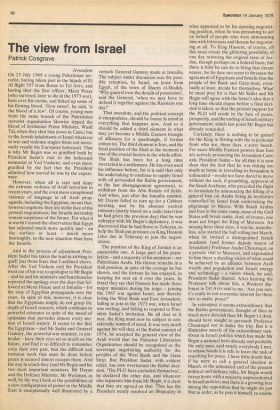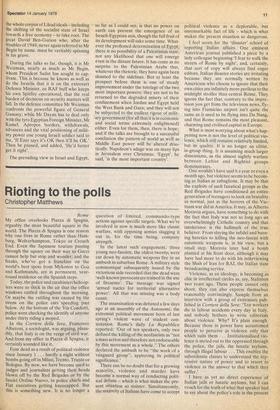The view from Israel
Patrick Cosgrave
Jerusalem On 23 July 1968 a young Palestinian terrorist, having taken part in the hijack of El Al flight 707 from Rome to Tel Aviv, and having shot the first officer, Maoz Poraz (who survived, later to die in the 1973 war), bent over his victim, and licked up some of his flowing blood. 'How sweet', he said, 'is the blood of a Jew'. Of course, young men from the same branch of the Palestinian terrorist organisation likewise sipped the blood of Jordanian Prime Minister, Wasfi Tal, when they shot him down in Cairo; but to the Jewish inhabitants of Israel whatever in war and violence singles them out necessarily recalls the European holocaust. That is why Mr Begin was so gratified both by President Sadat's visit to the holocaust memorial at Yad Vashem; and even more gratified by the fact that the President admitted how moved he was by the experience.
However, when all is said and done the extreme violence of Arab terrorism in recent years, and the even more exceptional violence of language in all Arab propaganda, including the Egyptian, means that, however euphoric they are in the face of the present negotiations, the Israelis inevitably remain suspicious of the future. For what it is worth I record the observation that Egypt has adjusted much more quickly and — on the surface at least — much more thoroughly, to the new situation than have the Israelis.
And in the process of adjustment President Sadat has taken the lead in striving to quell just those fears that I outlined above. After the Yad Vashem visit the President went out of his way to apologise to Mr Begin — and he and his ministers and functionaries repeated the apology over the days that followed at Mena House and at Ismailia — for the tone of Egyptian propaganda over the years. In spite of this, however, it is clear that the Egyptians simply do not grasp the depth of Israeli concern, which continues in powerful existence in spite of the mood of optimism that pervades almost every section of Israeli society. It seems to me that the Egyptians — and Mr Sadat and General Gamasy, the powerful war minister, in particular — have their eyes set so much on the future, and find it so difficult to remember even their own past, that the difficult and tortuous work that must be done before peace is secured almost escapes them. And the way in which they (and Mr Begin and his two most important ministers, Mr Dayan and the Defence Minister, Mr Weizman, as well, by the way) look at the possibilities of a new configuration of power in the Middle East is exceptionally well illustrated by a remark General Gamasy made at Ismailia. The subject under discussion was the possible retention, by Israel, on lease from Egypt, of the town of Sharm el-Shaikh. 'Why quarrel over the details of possession', said the General, 'when we may have to defend it together against the Russians one day?'
That anecdote, and the political concept it encapsulates, should be borne in mind in everything that happens now. And to it should be added a third element in what may yet become a Middle Eastern triangle of alliances (or a quadrangle, if Jordan comes in). The third element is Iran, and the focal position of the Shah at the moment is one of the crucial factors in the whole affair. The Shah has been for a long time interested in a settlement. He has even used his influence before, for it is said that only his undertaking to continue to supply Israel with oil persuaded the Rabin government, in the last disengagement agreement, to withdraw from the Abu Rodeis oil fields. And when, just after the Ismailia summit, Mr Dayan failed to turn up for a Cabinet meeting, and by his absence excited rumours (partly based on a radio interview he had given the previous day) that he was unhappy with Mr Begin's diplomacy, it was discovered that he had flown to Teheran, to help the Shah put pressure on King Hussein (also due in Teheran) to join the negotiations.
The position of the King of Jordan is an unenviable one. A large part of his population — and a majority of his ministers — are Palestinian Arabs. His throne remains in a frail position, in spite of the courage he has shown, and the fortune he has enjoyed, in keeping his seat on it over the years. In Israel they say that Hussein has made three major mistakes during his reign — joining the 1967 war against Israel, and thereby losing the West Bank and East Jerusalem; failing to join in the 1973 war, when Israel was reeling; and failing to respond to President Sadat's invitation. Be all that as it may, the King must now be subject to considerable turmoil of mind. It was very much against his will that, at the Rabat summit of 1974, he accepted the general view of the Arab world that the Palestine Liberation Organisation should be recognised as the sovereign negotiating authority for the peoples of the West Bank and the Gaza Strip. But President Sadat, with evident relief, has now overturned the Rabat decision. 'The PLO have excluded themselves', he declared the other day, and whatever else separates him from Mr Begin, it is clear that they are agreed on that. Thus has the President neatly resolved an illogicality in what appeared to be his opening negotiating position, when he was presuming to act on behalf of people who were denouncing him with bitterness and threats for negotiating at all. To King Hussein, of course, all this must create the glittering possibility of one day restoring the original state of Jordan, though perhaps on a federal basis; but there is little he can do to bring that dream nearer, for he dare not seem to threaten the agreement of Egyptians and Israelis that the people of the Bank and Gaza must, even tually at least, decide for themselves. What he must pray for is that Mr Sadat and Mr Begin will agree with the latter's idea that a long time should elapse before a final decision is taken, so that the present support for the PLO will erode in the face of peace, prosperity, and the ending of Israeli military government, which last point Mr Begin has already conceded.
Certainly, there is nothing to be gained for the King in flirting with the rejectionist front who are, these days, a sorry bunch. For more Middle Eastern powers than Iran are actively promoting the Jerusalem-Cairo axis. President Sadat — for all that it is now clear that the fear that he was risking too much at home in travelling to Jerusalem is unfounded — would not have dared to move without the tacit, if grumbling, approval of the Saudi Arabians, who preceded the flight to Jerusalem by announcing the lifting of a general ban on Arabs living in territories controlled by Israel from undertaking the pilgrimage to Mecca. With Saudi Arabia and Iran in the same camp, none of the Gulf States will break ranks. And, of course, one must not forget the King of Morocco. An unsung hero these days, it was he, nonetheless, who started the ball rolling last March, when he invited a distinguished Israeli academic (and former deputy mayor of Jerusalem) Professor Andre Chouraqui, on a private visit to Morocco, and expounded to him there a{lazzling vision of what could be achieved by an alliance between Arab wealth and population and Israeli energy and technology — a vision which, he said, President Sadat shared. After hearing the Professor talk about this, a Western diplomat in Tel Aviv said to me, 'Are you sure it's really in our economic interest for these two to make peace?'
In retrospect it seems extraordinary that the Rabin government, thought of then as much more doveish than Mr Begin's Likud, should have sought to persuade Professor Chouraqui not to make the trip. But it is illustrative merely of the extraordinary turnabout in Israeli politics which has made Mr Begin a national hero already and probably the only man, said nearly everybody I met, in whose hands it is safe to leave the task of searching for peace. I have little doubt that, if he were to call a general election in March, at the scheduled end of the present political and defence talks, Mr Begin would sweep home with a majority unprecedented in Israeli politics; and there is a growing fear among the opposition that he might do just that in order, as he puts it himself, to enable
the whole corpus of Likud ideals — including the shifting of the socialist state of Israel towards a free economy — to take root. The great David Ben-Gurion who, after the troubles of 1948, never again referred to Mr Begin by name, must be veritably spinning in his grave.
During the talks so far, though, it is Mr Weizman, nearly as much as Mr Begin, whom President Sadat has sought to captivate. This is because he knows as well as do the Israelis that it is on the extrovert Defence Minister, an RAF buff who keeps his own Spitfire operational, that the real burden of decisions on security matters will fall. In the defence committee Mr Weizman confronts the powerful figure of General Gamasy; while Mr Dayan has to deal only with the tyro Egyptian Foreign Minister, Mr Kamel. Apropos borders, withdrawals, advances and the vital pOsitioning of military power one young Israeli soldier said to me, `If Ezer says it's OK then it'll be OK.' Then he paused, and added, 'He'd better get it right'.
The prevailing view in Israel and Egypt, so far as I could see, is that no power on earth can prevent the emergence of an Israeli-Egyptian axis, though the full fruit of its development will take some time. Whatever the professed determination of Egypt, there is no possibility of a Palestinian state, nor any likelihood that one will emerge even in the distant future.. It has come as no surprise to the Palestinian Arabs that, whatever the rhetoric, they have again been shunted to the sidelines. But at least the prospect before them is one of steady improvement under the tutelage of the two most important powers: they are not to be returned to the degraded misery of their confinement when Jordan and Egypt held the West Bank and Gaza; and they will not be subjected to the endless rigour of military government (for all that it is in economic and social terms extremely enlightened) either. Even for them, then, there is hope; and if the talks are brought to a successful conclusion the pattern of world as well as Middle East power will be altered drastically. Napoleon's adage was on many lips in Jerusalem over Christmas. 'Egypt', he said, 'is the most important country'.































 Previous page
Previous page